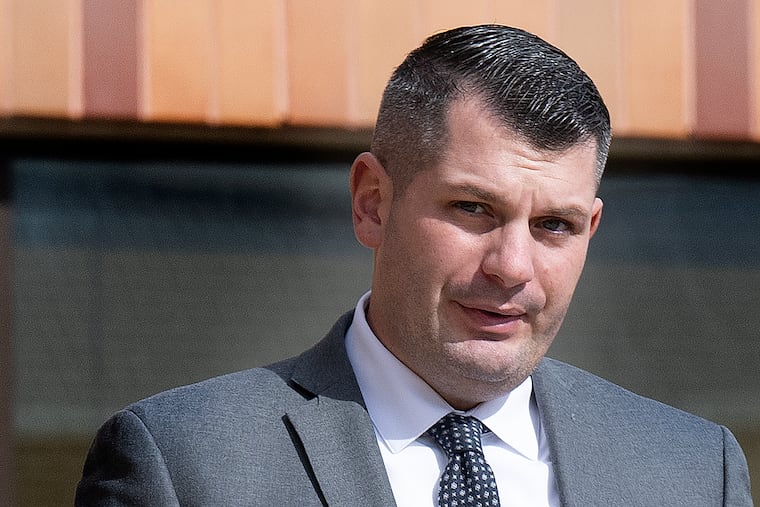Johnny Doc’s nephew pleads guilty in case involving threats against his former boss
Greg Fiocca, 32, cut a deal with prosecutors to avoid a retrial in a case that once threatened to send him and his uncle to prison on felony extortion charges.

READING — The nephew of former labor leader John Dougherty pleaded guilty to a single misdemeanor charge Monday, cementing a deal to resolve a case that had threatened to send both him and his uncle to prison for extortion.
Greg Fiocca, 32, of Philadelphia, acknowledged in court that he’d violently confronted one of his bosses during an August 2020 pay dispute at the then-under-construction Live! Casino and Hotel in South Philadelphia and insisted on being paid wages he was not owed.
His guilty plea to one federal count of unlawfully demanding money from a union employer — punishable by up to a year behind bars — comes five months after a jury was unable to reach a verdict during a trial in which both he and his uncle faced felony charges over the incident.
After that mistrial, government lawyers dropped their case against Dougherty — the former head of the state’s most powerful labor union against whom they’d previously won convictions in separate bribery and embezzlement trials. He’s scheduled to begin serving a six-year sentence on those charges next week and filed formal notice Monday of his intent to appeal.
» READ MORE: John Dougherty is headed to prison. But what happens next?
But before Monday’s deal to secure Fiocca’s guilty plea, prosecutors had signaled they were prepared to take Dougherty’s nephew to trial again.
A spokesperson for the U.S. Attorney’s Office in Philadelphia declined to comment Monday on the reasons behind their change in posture.
The charge to which Fiocca pleaded guilty cuts the maximum prison time he was facing by decades. U.S. District Judge Jeffrey L. Schmehl could also opt to spare Fiocca any incarceration at all and punish him with probation at a sentencing hearing on Jan. 7.
Fiocca, for his part, said little during Monday’s proceedings, mostly offering curt answers as the judge peppered him with questions to make sure he understood the ramifications of his plea.
“It was a difficult decision,” Fiocca’s lawyer, Rocco Cipparone Jr., said after the proceedings of his client’s decision not to take his chances at another trial. “But at the end of the day, we were able to reduce this down from 19 felony counts to one misdemeanor, which is much more closely reflective of what this case is about and allows him to move forward with his life.”
Unlike the 2021 and 2023 trials that ended in Dougherty’s conviction — both featuring dozens of witnesses and weeks of testimony about yearslong criminal schemes — the extortion trial in April was a more contained affair.
» READ MORE: John Dougherty, Greg Fiocca extortion case: Day-by-day updates
It centered on the events of a single day — Aug. 19, 2020 — and a conflict between Fiocca and a contractor who’d hired him along with roughly six dozen other members of his and Dougherty’s union, Local 98 of the International Brotherhood of Electrical Workers, at the casino site.
Fiocca’s bosses testified that he often failed to complete assigned tasks and frequently disappeared during working hours. But Dougherty’s nephew maintained that, as Local 98′s appointed steward on site, he was busy attending to the needs of his union’s members. That role, Fiocca’s lawyer said, became all the more demanding because the construction project was playing out during the early days of the coronavirus pandemic.
So, when project manager Rich Gibson docked Fiocca’s pay under the belief he wasn’t working, the decision sent Fiocca into a rage.
Prosecutors played secretly recorded audio of an explosive confrontation, in which Fiocca slapped Gibson, choked him, threw him onto a table, and spit on him twice after learning his pay had been cut.
“Next time this happens again, it’s not going to be no little f— push,” he shouted at his supervisor in the tirade caught on tape. “There’s no cameras in here. It’s your word against mine.”
When Dougherty found out about the job site skirmish, he took his nephew’s side.
Gibson and others demanded Fiocca’s removal from the project. Dougherty hinted he might pull all Local 98 electricians from the construction and said he wouldn’t support efforts by the contractor to land future work in the city unless his nephew remained on the job.
Though Dougherty never followed through on those threats, prosecutors maintained they were enough to convince Gibson and his company to keep Fiocca on its payroll.
Throughout the trial, defense lawyers insisted Dougherty never intended to threaten anyone and that, in fighting to protect his nephew’s job, he was doing what he would have done for any other member of his union involved in a pay dispute.
And the jury — after 11 hours of deliberations — announced they couldn’t agree on who to believe, a decision that prompted Schmehl to declare a mistrial after a single day of deliberations.
The panel offered no explanation in court for their inability to reach a verdict. But one of the jurors — speaking on the condition of anonymity to provide details on the closed-door deliberations — later told The Inquirer that 11 of the 12 members of the jury had been ready to acquit both Dougherty and Fiocca.
He cited, among other reasons, a legal defense, recognized by a 1973 U.S. Supreme Court ruling, that grants union officials some leeway to deploy threats of economic harm or force as a negotiating tool to achieve legitimate union objectives.
The juror said that some on the panel believed that Dougherty and Fiocca’s efforts to secure Fiocca’s wages fell within those bounds.
The juror chose to share that knowledge publicly, he said, in hopes it could influence prosecutors’ thinking about whether to retry the case and “save some people some time.”
Staff writer Oona Goodin-Smith contributed to this article.